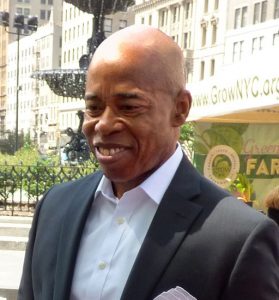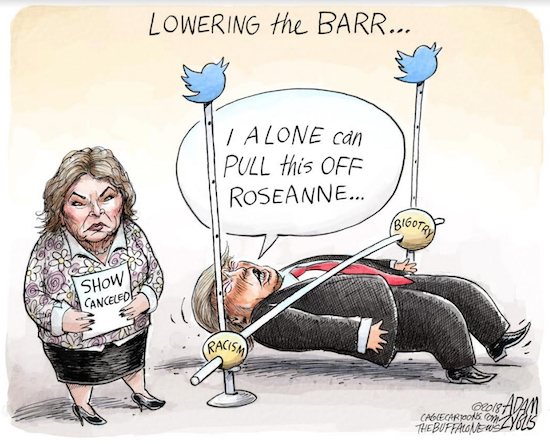
OPINION: With swift cancellation of ‘Roseanne,’ ABC draws line in sand

The “Roseanne” reboot could have been unifying TV. It was something rare in today’s US entertainment: a depiction of an extended working class family, including supporters of President Trump. Real-life families split by politics might have laughed together and looked at their own situation – for thirty minutes a week, at least.
Now it’s another possible symbol of division. The real-life Roseanne Barr is different than “Roseanne,” the character. Her outrageous tweets led to the show’s sudden cancellation. Some Trump supporters may see in this Hollywood bias toward the president in particular and conservative ideas overall.
The affair might be a useful example, though, in one sense — how formal institutions under political pressure from social media can handle their situation.
The willingness of ABC to nix “Roseanne” within hours of Ms. Barr’s tweets “sets a precedent” in the view of L.S. Kim, an associate professor of television studies at the University of California, Santa Cruz.
“I think in the current context of outlandish, outrageous, and impulsive statements released out into the Twitterverse, there has been a tentativeness about how formal institutions ought to respond,” Professor Kim wrote in an email. “[T]his powerful media company is setting a new example: there are consequences to abhorrent behavior, or at least, there can be.”
“Abhorrent” was what ABC entertainment president Channing Dungey called Barr’s actions in the brief statement announcing the show’s cancellation. The move came only hours after Barr unleashed a series of tweets that falsely claimed Chelsea Clinton was related by marriage to billionaire George Soros, and went downhill from there.
Barr included anti-Semitic references. In a blatantly racist tweet, she described Valerie Jarrett, an adviser to former President Barack Obama and an African-American, as an offspring of the Muslim Brotherhood and “The Planet of the Apes.”
ABC’s swift dumping of Barr follows other high-profile divorces between networks and celebrities. FX cut ties with comedian Louis C.K. and Netflix did likewise with Kevin Spacey, formerly the star of “House of Cards,” after allegations of sexual misconduct and sexual assault surfaced.
“This decision on ‘Roseanne’ seemed to be a no-brainer,” says Robert Thompson, director of the Bleier Center for Television and Popular Culture, based at Syracuse University. “She reached down the barrel for one of the most evil stereotypes there is. When the executives at ABC read that tweet, they must have known this ends only one way.”
David Schmid, an associate professor of English at the University at Buffalo and a pop culture expert, called ABC’s axing of the show “a good decision” that reflected the network’s desire to contain the damage of potential viewer and advertiser boycotts.
“This is all about the money. ABC realized that despite the success of ‘Roseanne,’ they were going to lose a lot of money,” he says.
Professor Schmid adds that Walt Disney Company executives — who named Ms. Dungey ABC’s entertainment president two years ago, making her the first African-American to lead a major broadcast network — quickly understood the cultural implications of Barr’s tweet.
“We’re talking about the company behind ‘Black Panther,’ ” he says, referring to the first superhero film with a black lead character, which earned more than $1.3 billion in worldwide box office since its release in February. “How’s it going to look if they defend something like what she wrote?”
Fans of the show expressed surprise and sorrow at its sudden cancellation.
Dale Atkinson, who lives in Grand Rapids, Michigan, says he was “shocked but kind of not shocked” by Barr’s tweetstorm, given her penchant for provocative statements and pushing cultural boundaries. He agreed with ABC’s decision while lamenting the demise of a show that depicted a world he recognized as his own.
“It dealt with everyday people, everyday situations,” says Mr. Atkinson, a retired factory worker. “I could relate to it, and a lot of people I know could relate to it. There aren’t a lot of shows like that on TV.”
Edward Van Dreal, another fan of the show, describes himself as a Trump supporter who switched political parties in 2012.
“[Roseanne] gets enormous support just because she’s willing to stand up and say she’s a Trump supporter,” says Mr. Van Dreal, a 60-something who lives in Courtland, Minnesota, some 90 miles southwest of Minneapolis, where he runs a long-haul trucking company.
He condemns Barr’s tweet about Ms. Jarrett yet holds out hope that the show will find another home. Earlier this month, Fox picked up “Last Man Standing,” a sitcom starring Tim Allen, a Republican, that ABC canceled last year.
“Roseanne self-destructed and said something that anyone would agree is inappropriate,” Van Dreal says. “ABC had to do what it had to do. But this isn’t over yet.”
It is possible that a niche broadcaster could pick up “Roseanne.” It’s highly unlikely that a network would risk it, however, if Barr remains part of the show.
In part that is because celebrities face greater consequences for behavior outside political norms than do politicians themselves, says Kathryn Cramer Brownell, an assistant professor of history at Purdue University and author of “Showbiz Politics: Hollywood in American Political Life.” In that sense modern celebrity may be more democratic than electoral politics.
Entertainment stars need broad-based popular support. “Celebrities depend on a market. They have to appeal to a national market,” Brownell says.
National politicians, on the other hand, often rely on a base of committed supporters for money and votes. They win by segmenting the population as opposed to appealing to all on a national basis.
“Their demographics are significantly smaller,” Brownell says.
She says this is perhaps why Barr has suffered greater consequences from her transgressive tweets than Mr. Trump has from his, which sometimes contain false statements, such as his charge that his campaign was wiretapped by President Obama.
Through Wednesday afternoon, Trump had refrained from direct comment on the Barr controversy. (When the show first aired, he called to congratulate Barr on its high ratings.)
He did issue one tweet that addressed the matter at an oblique angle.
“Bob Iger of ABC called Valerie Jarrett to let her know that ‘ABC does not tolerate comments like those’ made by Roseanne Barr. Gee, he never called President Donald J. Trump to apologize for the HORRIBLE statements made and said about me on ABC. Maybe I just didn’t get the call?” Trump tweeted.
Leave a Comment
Leave a Comment
